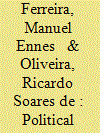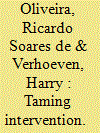|
|
|
Sort Order |
|
|
|
Items / Page
|
|
|
|
|
|
|
| Srl | Item |
| 1 |
ID:
080054


|
|
|
|
|
| Publication |
2007.
|
| Summary/Abstract |
This paper investigates a paradoxical case of business success in one of the world's worst-governed states, Angola. Founded in 1976 as the essential tool of the Angolan end of the oil business, Sonangol, the national oil company, was from the very start protected from the dominant (both predatory and centrally planned) logic of Angola's political economy. Throughout its first years, the pragmatic senior management of Sonangol accumulated technical and managerial experience, often in partnership with Western oil and consulting firms. By the time the ruling party dropped Marxism in the early 1990s, Sonangol was the key domestic actor in the economy, an island of competence thriving in tandem with the implosion of most other Angolan state institutions. However, the growing sophistication of Sonangol (now employing thousands of people, active in four continents, and controlling a vast parallel budget of offshore accounts and myriad assets) has not led to the benign developmental outcomes one would expect from the successful 'capacity building' of the last thirty years. Instead, Sonangol has primarily been at the service of the presidency and its rentier ambitions. Amongst other themes, the paper seeks to highlight the extent to which a nominal 'failed state' can be successful amidst widespread human destitution, provided that basic tools for elite empowerment (in this case, Sonangol and the means of coercion) exist to ensure the viability of incumbents.
|
|
|
|
|
|
|
|
|
|
|
|
|
|
|
|
| 2 |
ID:
108269


|
|
|
|
|
| Publication |
2011.
|
| Summary/Abstract |
Angola's oil-fuelled reconstruction since the end of the civil war in 2002 is a world away from the mainstream liberal peacebuilding approach that Western donors have promoted and run since the end of cold war. The Angolan case is a pivotal example of what can be termed 'illiberal peacebuilding', a process of post-war reconstruction managed by local elites in defiance of liberal peace precepts on civil liberties, the rule of law, the expansion of economic freedoms and poverty alleviation, with a view to constructing a hegemonic order and an elite stranglehold over the political economy. Making sense of the Angolan case is a starting point for a broader comparative look at other cases of illiberal peacebuilding such as Rwanda, Lebanon and Sri Lanka.
|
|
|
|
|
|
|
|
|
|
|
|
|
|
|
|
| 3 |
ID:
169771


|
|
|
|
|
| Summary/Abstract |
From inauspicious beginnings in a post-socialist, highly dysfunctional financial system, Angolan banking grew in less than a decade after the end of the country’s long civil war into one of Africa’s largest. Fuelled by the country’s oil boom, banks became crucial in articulating Angola’s interactions with the international system as well as a domestic agenda of oligarchic consolidation by the ruling MPLA’s elite. This article describes and analyses this growth trajectory in its historical and institutional context and seeks to understand the reasons why it did not lead to either a significant expansion of credit outside the elite or a contribution towards economic diversification outside the oil sector. Important as a study of the political economy of finance in Africa’s third largest economy, the article also contributes to the growing literature on the nexus between banking and politics in resource-rich states.
|
|
|
|
|
|
|
|
|
|
|
|
|
|
|
|
| 4 |
ID:
158013


|
|
|
|
|
| Summary/Abstract |
Military intervention in weak states by their more powerful peers is one of the great constants in the history of international relations, and is closely related to the question of state survival. In an anarchical international system characterised by a scarcity of resources, how do feeble polities manage threats to their sovereignty? African states in particular have been subject to continual interventions by outside forces, whether those of multilateral organisations such as NATO and the EU, or of individual great powers. This trend has only increased in the last two decades, owing, inter alia, to the ‘war on terror’, deepening worries over a nexus between security and migration, and the seemingly growing fragmentation of authority in numerous African states. The continent is the subject of two-thirds of UN Security Council discussions on armed conflict and the theatre of more ongoing UN peacekeeping operations than the remaining world regions combined. Yet it is striking that African states have not only maintained independent statehood and resisted regime change, but in recent years have both clamoured for extra-regional intervention and become avid inter-regional interveners themselves. A continent that might once have been described as the world’s most sovereigntist has thus, intriguingly, become highly tolerant, and even encouraging, of military intervention. Why?
|
|
|
|
|
|
|
|
|
|
|
|
|
|
|
|
|
|
|
|
|